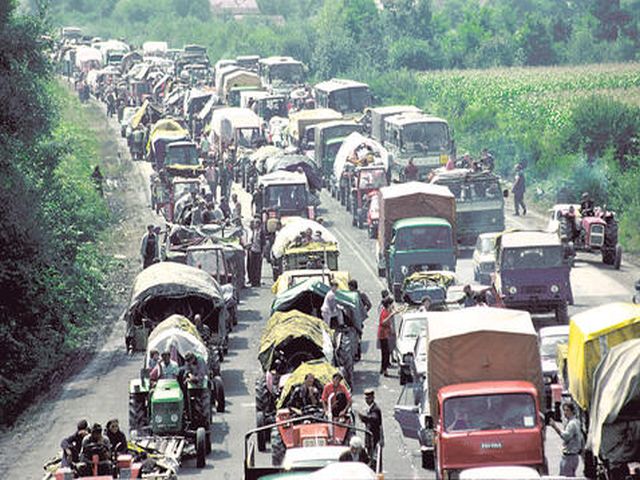
25 years since the military operation “Storm”: A day of remembrance, sadness and lighting of candles
04.08.2020. In total 25 years have passed since one of the saddest events in modern history when during the military operation “Storm”, over 250,000 Serbian people were chased from their homes in the Republic of Croatia where they had been living for centuries. This is a day of remembrance, a day of sadness, a day to light candles and mourn the deaths of the over 1,700 people who lost their lives or disappeared, of which number 770 still remain unaccounted for with no knowledge of what befell them or where their graves might be.The wars of the90’s which transpired in the last century on the territory of the Former Yugoslavia produced a large wave of refugees heading from areas within the former SFRY into Serbia. Sanctuary, security and a new life was sought by close to 618,000 Serbs from Croatia and Bosnia and Herzegovina, while the bombing campaign of 1999 produced a further 200,000 internally displaced persons from Kosovo and Metohija.
Even after a quarter century has elapsed, not much has been done towards the establishment of a climate of trust, primarily on account of the fact that Serbs who were forcibly evicted from Croatia, have been unable to gain access to their land rights and other human rights. The small number of them that have managed to return, continue to live in an atmosphere of national intolerance.
Despite the fact that today both Serbia and Croatia have their respective representatives within their governments and parliaments, a multitude of unresolved issues as yet remain: compensation for damaged and or destroyed property has not been made available; agricultural lands usurped from Serbian people has not been returned; the Republic of Croatia has failed to implement its constitutional Law on Minority Rights by means of which Serbians are to be guaranteed proportional representation and employment within the organs of national administration, police, justice department and other public institutions; pensions due remain as yet unpaid.
The Commissariat for Refugees and Migration over the course of the past years has worked and continues to work on providing accommodation and economic support to refugees and internally displaced persons. The Republic of Serbia had initially accepted over 60,000 persons, accommodated in some 700 collective centres, all of which have been closed to date with the exception of one. Similarly, in recent years the country has managed to put in place accommodation solutions for 22,330 families and has provided economic support to a further 21,000 families from out of the budget of the Republic of Serbia and such donor funds as have been provided.
By means of the Regional Housing Program currently being implemented more than 5,000 families have been provided with durable housing solutions, buildings have been completed within 33 municipalities and building sites have been opened in a further 20 cities and municipalities. In total 1.361 apartments have been allocated, 1,865 packages of building materials have been distributed, 290 prefabricated houses have been built and 1,344 village households have been purchased for refugees from the Republic of Croatia and the Federation of Bosnia and Herzegovina.
The Commissariat for Refugees and Migration of the Republic of Serbia is grateful to all donors and international organizations for the resources they have provided for the resolution of the accommodation needs of refugees, but nevertheless continues to emphasize the need for the resolution of all as yet outstanding and open questions which delay the attainment of durable solutions for the refugee population, as also the need for addressing the accommodation and other concerns of the some 200,000 internally displaced persons from Kosovo and Metohija.
The Republic of Serbia considers that the continuation of activities concerning the implementation of Annex E & G of the Agreement on Succession is a matter of high priority, alongside the other activities leading to the resolution of the problems of refugees. In this regard we expect the continued support of the international community.
A remembrance for the victims of this tragedy will be held on the 5th of August 2020 at 11:00 in the St. Mark Church in Belgrade, as also in a number of other locations throughout the Republic of Serbia.

